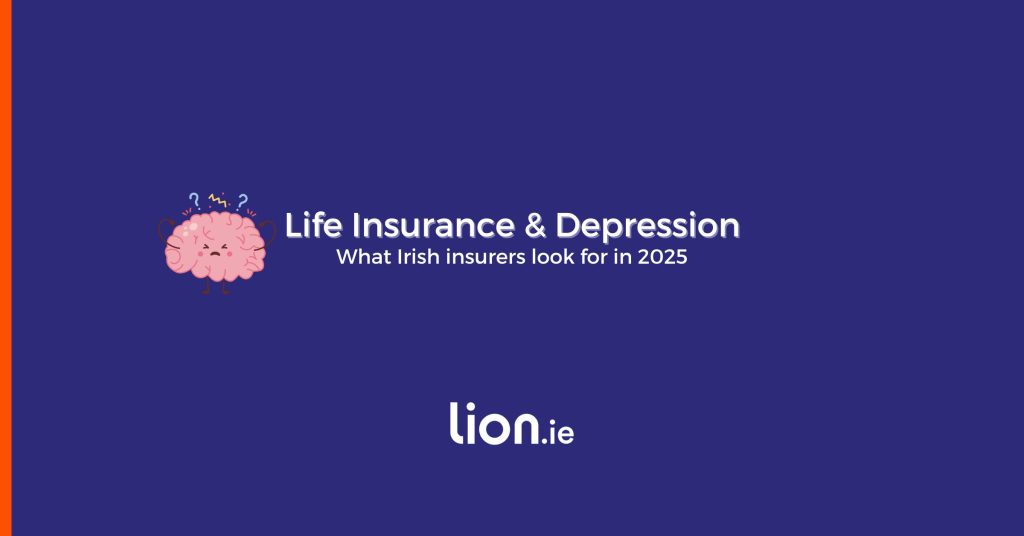Table of Contents
10-second summary: You can get life insurance, mortgage protection or income protection with depression in Ireland. Mild or well-managed depression is often accepted at standard rates; more severe or recent episodes may lead to loadings or postponements. Suicidal thoughts or in-patient treatment within two years usually require a period of stability before insurers will offer cover.
Editor’s note: First published 2017 | Refreshed November 2025 with updated Irish underwriting rules, 2025 depression guidelines, and clearer mortgage-protection expectations.
Depression is incredibly common in Ireland.
Insurers see it every day, and it rarely stops anyone from getting life insurance or mortgage protection.
But the process can still feel overwhelming, especially when you’re asked to discuss something so personal with a stranger.
This guide walks you through exactly how Irish insurers underwrite depression, anxiety and stress in 2025 — and what to expect depending on your history. If you’d prefer a broader overview, see our full mental health life insurance guide.

If you’re worried your depression means the bank won’t let you draw down — breathe.
Depression is one of the most common medical issues insurers see.
You’re not unusual, you’re not a red flag, and you’re not going to be punished for being honest.
Here’s the reality in Ireland in 2025:
However:
Postponement doesn’t mean decline — it simply means insurers want to see a stable period first.
If you’ve previously been turned down, have a look at what to do if you’re declined for life insurance.
If you want me to check what’s possible for your situation, complete the short mental health questionnaire and I’ll review it personally.
Alongside depression, anxiety and stress are now the most common mental-health disclosures on Irish life insurance forms. Insurers see:
In most cases, these do not prevent you getting mortgage protection or life insurance.
Typical outcomes:
Postnatal depression is assessed differently from ongoing mental health conditions.
Insurers use clinical definitions based on GP or specialist notes. In simple terms:
Triggers vary — bereavement, relationship breakdown, work stress, illness, trauma, or financial pressure.
A quick reassurance:
Being on medication (SSRI/SNRI) is not a red flag.
Insurers see sertraline, fluoxetine, citalopram etc. every single day.
If you want to understand the full underwriting process, here’s a simple breakdown of how life insurance works in Ireland.
When reviewing a case, insurers look at:
Alcohol/substance use matters because high intake can worsen symptoms or make relapses more likely — so it will always be considered.
Mild, well-controlled depression: often standard rates.
Moderate or severe depression: loadings of 50%–150% are common.
Recent severe symptoms or hospitalisation: may lead to postponement.
This is why picking the right insurer matters — some are much more understanding than others.
We’ll ask you to complete a mental health questionnaire with details such as:
We then discuss your case anonymously with all five insurers to see which one will give you the best terms.
Sometimes a questionnaire alone is enough.
If not, the insurer may request a GP report.
If you’re also dealing with bipolar disorder, the approach is different — and usually more dependent on long-term stability.
Income protection is stricter than life insurance or mortgage protection.
A few key points:
Every insurer has its own approach — which is why it’s essential to match your situation to the right one.
For general provider differences, see compare Irish income protection insurers.
Molly separated from her partner four years ago, experienced anxiety and sleeplessness, took occasional medication, and attended counselling. Her symptoms resolved three years ago. We reviewed her case with all five income protection providers.
Responses ranged from “minimum mental health exclusion” to “no exclusion required”.
Three insurers wanted to exclude mental health; two did not.
Molly secured full income protection with one of the more understanding insurers.
Moral of the story: the insurer you choose matters — a lot.
If you’d like help finding the most understanding insurer, complete the mental health questionnaire or email me directly at nick@lion.ie. All conversations are strictly confidential.

Written by Nick McGowan, QFA RPA APA
Nick is a qualified financial advisor and founder of Lion.ie, an independent Irish life-insurance and income-protection brokerage based in Tullamore. He’s been helping people get fair, transparent cover for over 15 years — and was named Protection Broker of the Year 2022.
If you’d like straight answers (without the sales pitch), learn more about Nick here.
As Ireland's leading life insurance broker, we specialise in comparing the rates and policies from the top five Irish life insurance providers and offering the very best value quotes to suit the individual needs of our clients. Our expertise lies in finding a suitable insurance plan for those with specific needs, be it a particular illness, occupation or claim history, we've got you covered in every sense!
Watch our video